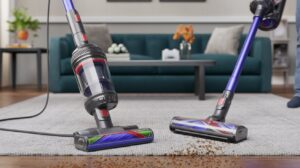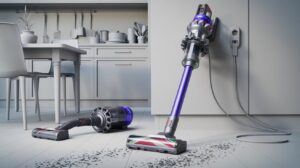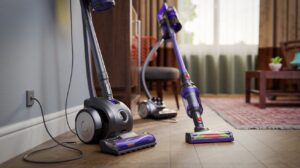Corded vs. Cordless Vacuums: Which One Suits Your Lifestyle?
Vacuuming is an essential task in maintaining a clean and healthy home, but with so many types of vacuum cleaners on the market, choosing the right one can be overwhelming. Among the most popular types are corded vacuums and cordless vacuums. Each has its own set of advantages and disadvantages, and the right choice for you depends on your home size, lifestyle, and cleaning needs.
In this comprehensive guide, we’ll break down everything you need to know about corded vs. cordless vacuums, comparing their pros and cons, key features, and helping you decide which one fits best into your daily routine.

Understanding Corded and Cordless Vacuums: A Quick Overview
Before diving into the details of cordless vs. corded vacuums, let’s start by understanding what sets them apart.
What Are Corded Vacuums?
A corded vacuum cleaner is the traditional type of vacuum that operates by plugging into an electrical outlet. The cord allows it to draw power directly from the source, offering continuous suction without interruptions due to battery life.
Key features of corded vacuums:
- Constant Power: Corded vacuums provide continuous suction, meaning you don’t have to worry about losing power mid-clean.
- Ideal for Large Homes: With unlimited power, corded vacuums can clean larger areas without stopping to recharge.
- Heavy Duty: These vacuums are typically more powerful than their cordless counterparts, making them suitable for deep cleaning carpets, handling large debris, or cleaning high-traffic areas.
What Are Cordless Vacuums?
On the other hand, cordless vacuums rely on rechargeable batteries for power. They are portable and convenient, allowing you to clean without worrying about a power cord getting in the way.
Key features of cordless vacuums:
- Battery-Powered: Cordless vacuums are powered by rechargeable batteries, which makes them highly portable and easy to maneuver.
- Lightweight and Compact: Many cordless vacuums are designed to be lightweight and easy to store, making them great for smaller homes, apartments, or spaces with limited storage.
- Convenience: The absence of a cord allows you to clean freely, especially in tight spaces, stairs, and cars.
Both types have their unique set of benefits. In the following sections, we’ll dive deeper into each category and discuss the pros and cons of corded vs. cordless vacuums in more detail.
Corded Vacuums: Pros, Cons, and Key Considerations
Advantages of Corded Vacuums
Corded vacuums have long been the go-to choice for households. They are known for their robust performance and versatility. Here’s why a corded vacuum cleaner might be the right choice for you:
1. Consistent Power and Suction
One of the most significant advantages of corded vacuums is that they provide a constant source of power. You won’t experience the frustrating loss of suction as the battery of a cordless vacuum cleaner depletes. Whether you’re cleaning for an hour or more, a corded vacuum can maintain its suction power, allowing you to clean deeply and effectively.
2. Perfect for Deep Cleaning
Because they have continuous power, corded vacuums are often better suited for deep cleaning tasks, such as scrubbing carpets, cleaning up pet hair, or picking up larger debris. If you have a lot of carpets, rugs, or thick fabric upholstery in your home, a corded vacuum cleaner will give you the deep cleaning power you need.
3. Ideal for Larger Homes
If your home has multiple rooms or multiple levels, a corded vacuum cleaner can be a good fit. The continuous power and longer cleaning time mean you can vacuum an entire floor or a large space without stopping to recharge the vacuum.
4. Typically More Affordable
In general, corded vacuums tend to be more affordable than cordless models. Because they don’t rely on batteries or advanced battery technology, corded vacuums are often less expensive, making them a great option for those on a budget.
Disadvantages of Corded Vacuums
While corded vacuums have many strengths, they also have some drawbacks that might make them less appealing for certain individuals:
1. Limited Range and Mobility
One of the biggest downsides of a corded vacuum cleaner is that it’s tied to the power outlet by the cord. While you can use extension cords to reach further, this still limits your mobility. This can be particularly frustrating when cleaning areas like stairs or large rooms without many power outlets.
2. Bulkier Design
Many corded vacuums are heavier than their cordless counterparts. The added weight, combined with the need to drag the vacuum around, can make cleaning a tiring task, especially in homes with multiple levels or large open spaces.
3. Storage Issues
Corded vacuums can take up more space in storage due to their bulkier design. They often require more space in closets or cupboards, which can be problematic if you have limited storage space in your home.

Cordless Vacuums: Pros, Cons, and Key Considerations
Advantages of Cordless Vacuums
Cordless vacuums have surged in popularity over the years, thanks to their convenience, lightweight design, and portability. Here’s why you might consider a cordless vacuum cleaner:
1. Portability and Freedom
The main selling point of a cordless vacuum cleaner is the freedom from cords. Without the tether to an electrical outlet, you can easily move around your home, cleaning hard-to-reach areas like corners, stairs, and under furniture without being restricted by a power cord.
2. Ideal for Quick Clean-Ups
Cordless vacuums are perfect for quick clean-ups, especially in homes with pets, kids, or people who frequently entertain guests. If you need to quickly vacuum up crumbs, pet hair, or dirt, a cordless vacuum allows you to handle those messes without hassle.
3. Lightweight and Easy to Maneuver
Compared to traditional corded vacuums, cordless vacuums are usually lighter and easier to maneuver. This is particularly useful for people with mobility issues, elderly individuals, or those who find the bulk of corded vacuums challenging to use.
4. Compact and Easy to Store
Due to their slim design, cordless vacuums are easy to store. They can fit into tight storage spaces, closets, or cupboards without taking up much room. This makes them a great choice for apartment dwellers or people with limited space.
Disadvantages of Cordless Vacuums
While cordless vacuums are convenient, they come with their own set of challenges:
1. Battery Life Limitations
Battery life is a major limitation of cordless vacuums. Depending on the model, most cordless vacuums can only run for 20 to 60 minutes before needing a recharge. This may not be enough for deep cleaning large spaces or for cleaning your entire home.
2. Less Suction Power
Although newer models are more powerful, cordless vacuums typically don’t provide the same level of suction power as corded vacuums. If you have thick carpets or heavily soiled areas, a corded vacuum may be a better option for providing consistent and powerful cleaning performance.
3. Higher Initial Cost
While some cordless vacuums are affordable, others can be quite expensive, particularly those that feature advanced battery technology, stronger suction, and extra features like HEPA filtration or specialized pet tools.
Factors to Consider When Choosing Between Corded and Cordless Vacuums
Choosing between a cordless vacuum cleaner and a corded vacuum cleaner depends on several factors that align with your specific needs. Here are the key considerations to help you make an informed decision:
1. Home Size and Layout
- Large Homes: If you live in a larger house or have multiple floors, a corded vacuum cleaner may be better suited for you. Its constant power and longer runtime make it ideal for cleaning multiple rooms or large spaces.
- Smaller Homes or Apartments: For those living in apartments or smaller homes, a cordless vacuum cleaner can provide the flexibility needed to clean without the hassle of a cord, especially in tight areas like stairs or small rooms.
2. Frequency of Cleaning
- Frequent Deep Cleaning: If you clean your home weekly or bi-weekly, you may need the power and extended runtime of a corded vacuum. For daily or light maintenance, a cordless vacuum is a great choice for quick pickups and routine cleaning.
- Quick Clean-Ups: If you need to clean up after children, pets, or guests, a cordless vacuum cleaner provides quick, efficient cleaning without the time spent plugging and unplugging a corded vacuum.
3. Type of Flooring
- Carpets: If you have thick carpets or rugs, a corded vacuum cleaner generally offers better suction power for deep cleaning.
- Hard Floors: Cordless vacuums are excellent for hard floors, tile, and laminate surfaces. Many models are designed with suction settings specifically for these types of floors.
4. Storage Space
If storage space is a concern in your home, a cordless vacuum is easier to store due to its compact design. Corded models tend to be bulkier and require more room.

Top Recommendations for Corded and Cordless Vacuums
Best Corded Vacuums
- Shark Navigator Lift-Away: This vacuum combines the power of a corded vacuum cleaner with a lightweight, versatile design that makes it ideal for homes with a mix of floors.
- Dyson Ball Multi Floor: Known for its strong suction and maneuverability, the Dyson Ball is a powerful option for homes that require heavy-duty cleaning.
Best Cordless Vacuums
- Dyson V11 Torque Drive: One of the best cordless vacuums for pet hair, the Dyson V11 offers strong suction, a long-lasting battery, and the flexibility to clean without cords.
- Shark ION F80: A great mid-range option that provides powerful suction and multiple tools for tackling various cleaning tasks.
Conclusion
When deciding between cordless vs. corded vacuums, it’s crucial to consider factors such as your home’s size, the frequency of cleaning, and the type of floors you have. Corded vacuums are ideal for deep cleaning large homes with carpets and heavy-duty tasks, while cordless vacuums offer portability, lightweight convenience, and quick clean-ups for smaller spaces. Understanding the pros and cons of each will help you choose the right vacuum that best suits your lifestyle and cleaning needs.
Both types of vacuums have come a long way in terms of technology and design, so no matter which one you choose, you’ll be able to keep your home sparkling clean with minimal effort.